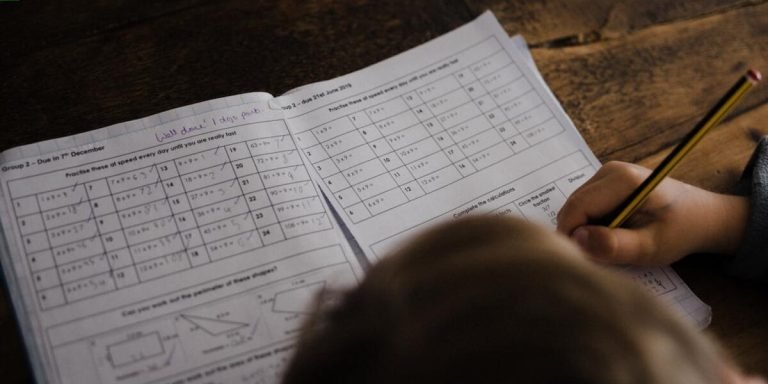Basic Reading Skills: Essential Foundations for Childhood Education
Understanding the value of basic reading skills in children’s education cannot be overstated. These key competencies lay the groundwork for all future learning and academic success, shaping a child’s educational journey at its earliest stages.
This blog post aims to enlighten parents about fundamental reading abilities that every child should master – an essential part of homeschooling or any form of childhood education. We delve into understanding what these crucial skills are and how you, as parents or educators, can foster them effectively from home.
Did you know?
Children engaging in reading activities with their parents at home achieve up to a 7.4% higher success rate in language acquisition and literacy skills. (Source: National Education Association)
Understanding the Building Blocks of Basic Reading Skills
Reading is undoubtedly a fundamental skill for children to master, which becomes the cornerstone of their academic and personal growth. When it comes to homeschooling education in 2023, understanding the building blocks of basic reading skills has become even more essential. As opposed to traditional schooling methods, parents and educators undertaking homeschooling bear a broader responsibility.
They not only need to teach these key skills but also instill an enduring love for reading that can help children broaden their horizons.
Basic reading skills encompass several elements including phonemic awareness, decoding abilities (phonics), fluency, vocabulary acquisition – all leading up towards comprehension – the ultimate goal of every reader’s journey. Phonemic awareness enables kids to distinguish different sounds within words while decoding aids them in connecting these sounds with letters or group of letters. Fluency refers to the ability read quickly yet accurately whereas vocabulary development helps them familiarize themselves with varied terms used frequently across texts.
Comprehension enables young learners in home-schools to effectively absorb what they read. It transforms reading from a passive activity into an engaging experience filled with imagination and exploration. We can equip future generations to unlock endless possibilities by nurturing foundational literacy skills early during childhood through learning strategies tailored for homeschoolers. In a world rich with academic, personal, social, and emotional opportunities, we empower individuals to reach their full potential beyond traditional classrooms and textbooks.
Exploring Phonemic Awareness in Home Education
Phonemic awareness serves as a vital foundation in your child’s journey towards acquiring basic reading skills. As part of home education, this knowledge becomes even more crucial to develop effectively.
In the simplest terms, phonemic awareness revolves around understanding how sounds form into words. We can all agree that it isn’t enough for children just to recognize letters visually; they need to understand their sounds and how those sounds blend together to create meaningful words.
Learning these linguistic nuances at home might seem daunting initially, but with time and patience, you’d be surprised by the progress your child makes in mastering basic reading skills!
Here are some methods you could employ while exploring Phonemic Awareness in Home Education:
1. Rhyming Games: Incorporate games such as “I Spy” or simple rhymes into daily activities making learning fun-filled.
3 .Blending Sounds Together: Encourage your kids not only separate out various phonemes within a word but also combine them back together after breaking apart.
Decoding and Fluency: Strategies for Homeschooled Children
Decoding and fluency are foundational to a child’s basic reading skills, especially for those embarking on their homeschooling journey. These two components work in conjunction to aid your child not only to read but also comprehend text efficiently.
Starting with decoding, it is the ability that assists children in recognizing words by correlating the sounds linked with particular letters or group of letters. Remember this when teaching them at home: Phonics provides an excellent basis here. It involves associating phonemes (sounds) and graphemes (letters).
For instance, b-a-t would be merged together as ‘bat’. Begin gradually – starting off easy helps kids gain confidence before jumping into more complicated arrangements.
Fun ways to practice phonics include matching games wherein youngsters match voice recordings with corresponding icons or finding objects around the house beginning with certain sounds/letters can keep things engaging while effectively aiding learning progress which takes us back again emphasizing on our keyword “Basic Reading Skills”.
Fluency goes hand-in-hand with decoding; once your little scholar has mastered identifying words via sound-letter associations its time we shift gears towards improving their reading flow i.e., speed & expression combinedly termed as fluency. Repeated readings help here vastly!. Let them pick out short passages from their favorite books then have re-reads till they’re able comfortable enough without halting between sentences allowing smoother rendition each reread thus enhancing comprehension ultimately leading better understanding academic subjects you’ll cover during homeschool sessions.
Tailoring Instruction to Enhance Comprehension at Home
In the realm of homeschooling and education, tailoring instruction to enhance comprehension is paramount. As parents and educators navigate this pathway in 2023, the focus on basic reading skills has become a vital aspect.
The key lies in personalizing lessons that resonate with each child’s unique learning style. For instance, visual learners might benefit from illustrative videos or books abundant with photographs while auditory learners may find audio-books more engaging. Interactive reading exercises can flesh out concepts for tactile learners who grasp new information through touch and movement.
Remember, children do not neatly fit into just one ‘type’ of learner so it’s essential to integrate varied methods within your teaching approach. This diversified path strengthens their basic reading ability by empowering them to grasp words from different angles – visually seeing a word written down; verbally hearing its sounds blend together; kinesthetically feeling how their mouth forms each syllable.
Furthermore, staying attuned to your child’s interests will skyrocket their engagement levels during reading sessions too! Does he love dinosaurs? Consider picking out dinosaur-themed storybooks or encyclopaedias as his introductory literature piece thereby elevating his enthusiasm towards absorbing new vocabulary presented therein.
Lastly, remember patience is crucial when imparting these core literacy tools as every young mind blooms at its own pace under custom-tailored guidance and consistent practice right at home itself.
Differentiated Learning Techniques for Individual Pacing
In today’s fast-paced world, home schooling has emerged as a popular education method with its unique approach to learning. One such effective strategy is differentiated learning techniques which help in individual pacing of children based on their strengths and weaknesses.
Understanding that every child learns differently, you can tailor your teaching methods at home to amplify basic reading skills effectively. This personalized instruction helps enhance comprehension while catering to the diverse needs of each learner.
Firstly, make sure you gauge your child’s current level in basic reading skills. A simple assessment could be asking them to read aloud from a storybook or an online resource suitable for their age group or skill level.
Focus on these crucial areas now, but remember, not all strategies need to conform to the same standard format; make room for creativity! For instance:
– If your child struggles with decoding unfamiliar words then introduce phonics games into daily activities.
The Role of Vocabulary Development in Reading Proficiency
In the continuum of basic reading skills for younger learners, vocabulary development plays a pivotal role. As parents and home educators in 2023, an understanding of this process can be incredibly beneficial when tailoring instruction to enhance comprehension at home.
Vocabulary forms the building blocks of language proficiency. Words are like keys that unlock meaning from print making it essential content during your homeschooling sessions. Expanding a child’s vocabulary helps them comprehend texts more proficiently since they’re able to understand more words and their meanings.
There is a direct correlation between children who have ample vocabularies and higher literacy levels later in life. This makes investing time on vocabulary expansion crucial – shaping not only current learning experiences but also future academic accomplishments.
To kickstart this journey, encourage daily reading practices with diverse genres ranging from storybooks to informational blogs or e-books found online (remember we live in increasingly digital times). Diverse materials introduce new words naturally into your child’s lexical repertoire.
Word games offer another fun approach towards broadening word knowledge while fostering constructive playtime engagements too! They could range from traditional scrabble matches to innovative app-based versions accessible via tablets or laptops – definitely popular tech tools among today’s young learners!
Engage kids actively by involving them in conversations on varying topics including those beyond their comfort zone; aim for discussions which compel usage of unfamiliar terminologies thereby prompting exploration and assimilation into everyday lingo swiftly thereafter.
Integrating Technology into Homeschooling to Support Basic Reading Skills
As we journey deeper into the digital age, it has become crucial for parents and educators to integrate technology into homeschooling programs in order to foster basic reading skills. With a myriad of educational applications available at our fingertips now more than ever before in 2023, leveraging these tools can create an engaging and interactive platform that enhances learning experiences.
Harnessing the power of tech aids not only sparks curiosity but also reinforces key concepts with their immersive features. Picture this: A child is introduced to phonics through vivid images paired with audio pronunciations on an app rather than just mere text from a book; creating stronger visual-audio associativity, thus improving his/her comprehension and fostering better retention.
However, let’s not aver eyes away from challenges involved here as well – managing screen time effectively remains pivotal amid infusing technology-led learning methods. Making sure your ward isn’t straying off online or spending excessive hours glued onto screens involves dedicated involvement along this educational endeavor. Implement strategies like setting up timers for study sessions or using parental controls where necessary; all while facilitating development of children’s innate love for reading via modern technological approaches which are boundless today in 2023.
Educational Apps and Programs for Reinforcing Literacy
With the rise of technology, homeschooling has evolved significantly over recent years. One area that’s seen extensive growth is in resources to support basic reading skills through educational apps and programs.
Today’s parents and educators have a wealth of tools at their fingertips for enhancing literacy education. These platforms not only make learning more exciting but also offer tailored approaches suiting various learner types – visual, auditory or kinesthetic learners alike.
One highly recommended tool is Reading Eggs. Recognized across digital learning landscapes, this unique app makes reading fun with games-infused lessons aimed at reinforcing phonics knowledge alongside sight word recognition – key elements in mastering basic reading skills. The interactive nature encourages children to engage and ultimately foster love towards literary skills from an early age.
ABCmouse.com Early Learning Academy boasts comprehensive curriculum covering subjects like math and art along with critical pre-reading activities such as rhyme identification & letter-sound connections — fundamentals vital during formative years setting foundation stones for future academic success.
Complementing these utilities are eBooks functionalities offered by Amazon Kindle Kids Edition or Epic! Both strewn with wide-ranging stories suited for varied reader levels; further strengthening vocabulary whilst nurturing imagination concurrently—making them indispensable assets within any homeschooler’s teaching toolkit striving hard 2023-style!
Utilizing E-Books and Audiobooks to Encourage Independent Reading
As you embark on the journey of homeschooling, leveraging technology to nurture basic reading skills is essential. The digital era presents an array of resources for this purpose and among them are E-books and audiobooks. These tools can foster independent reading in a fun-filled manner.
E-books or electronic books have revolutionized how children access written content since they came into vogue in 2023. They offer interactive features that make learning more engaging such as hyperlinks, audios, videos or animation alongside text thus catering to diverse learner needs; visual learners get satiated by graphics while auditory ones relish accompanying sounds.
By integrating E-books into your child’s daily routine, you don’t only accommodate their interests but also expose them to vast genres from around the world without leaving home which otherwise could be limiting due physical constraints like library operating hours or resource availability at bookstores nearby.
Audiobooks act as an incredible tool for developing listening comprehension, a key component of basic reading skills. Kids who regularly listen to narrated stories with varied intonation and pauses understand punctuation marks’ importance better and reinforce their phonics awareness. They also build their vocabulary through context clues in storylines instead of relying only on explicit definitions, which might seem overwhelming at first. This practice becomes especially useful during homeschool sessions that use printed materials.
Conclusion
In summary, as we navigate the path of childhood education together, it becomes perfectly evident that integrating basic reading skills early in a child’s educational journey is non-negotiable. From comprehension to pronunciation and vocabulary building; these skills are not just essentials but also tools that open up countless opportunities for children- creating explorers out of young minds.
As you continue this exciting quest as parents or educators, remember our website serves as an island full of crucial resources. We encourage you to explore further topics on educating youngsters and seek support from our richly informational content designed specifically keeping your needs at heart. Your commitment today sows seeds for brighter learners tomorrow!







